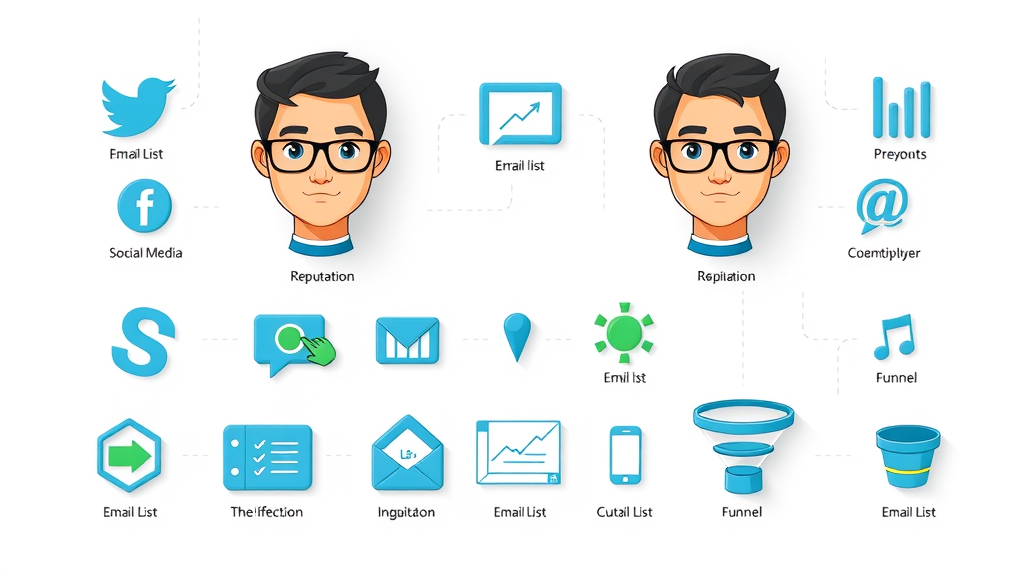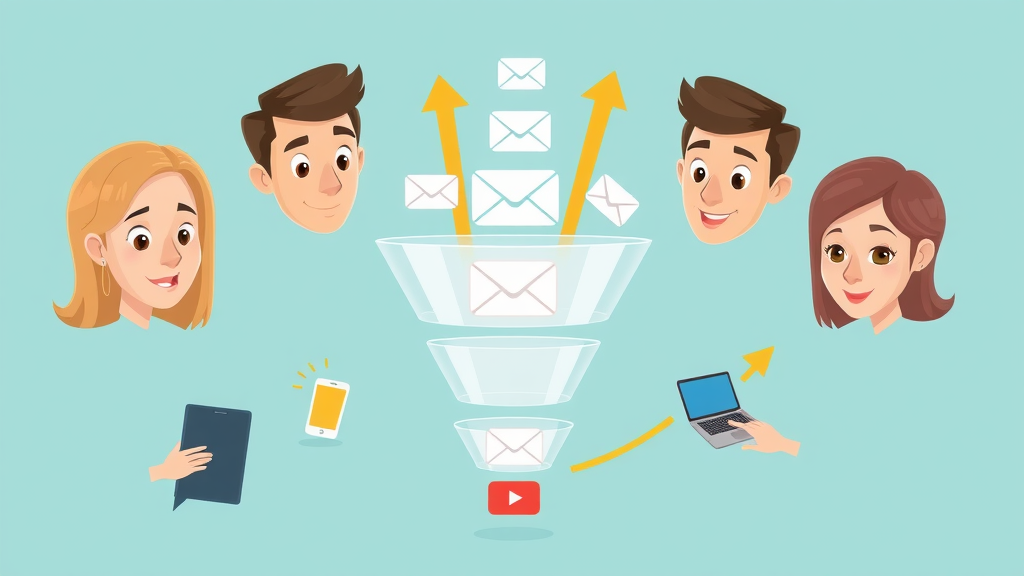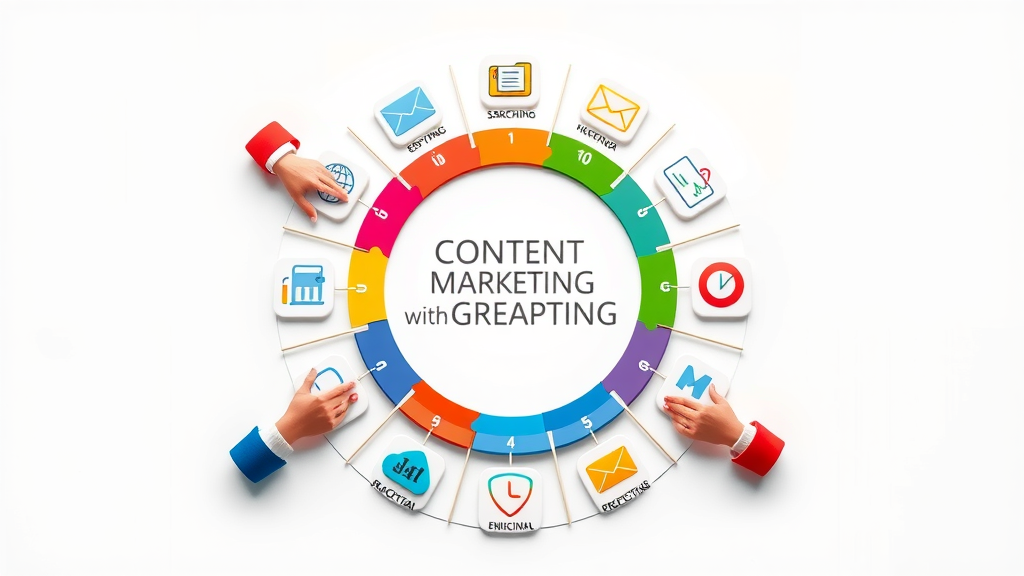
Did you know that businesses investing in online marketing see an average ROI of 122%, surpassing traditional marketing by a huge margin? In today's digital-first world, your sales growth and visibility rely on how well you harness the magic of online marketing. This comprehensive guide reveals the Core 4 areas that transform your efforts from unseen to truly unforgettable—and provides actionable steps to dominate your market faster than you ever thought possible.
Startling Online Marketing Statistics: Why Now Is the Time
"Businesses that invest in online marketing see an average ROI of 122%—outpacing traditional marketing by a landslide."
The digital marketplace is evolving at breakneck speed. With over 4.7 billion active Internet users and roughly 93% of online experiences beginning with a search engine, brands that fail to optimize their online presence risk fading into obscurity. The stats speak volumes: 70% of shoppers research a business online before making a purchase, and digital marketing channels continue to outperform traditional marketing in both reach and ROI. Whether it’s social media, email marketing, or innovative marketing funnels, your competition is already leveraging these strategies. To stand out and reach potential customers before your rivals do, you must act now—because in online marketing, speed and adaptability mean everything.
The shift from print ads and billboards to digital channels isn't a trend—it's the new reality for success. Companies embracing online marketing access expansive audiences, gather measurable insights, and fuel sales with automated strategies 24/7. This is your chance to harness cost-effective, data-driven marketing channels and create a marketing strategy that delivers consistent sales growth. Read on to discover what it takes to leave your competitors in the dust.
What You'll Learn About Online Marketing
- The definition and significance of online marketing in today’s digital landscape
- The Core 4 areas of marketing for explosive sales growth
- Proven strategies for social media marketing, reputation marketing, list building, and automated funnels
- Actionable tips for implementing effective marketing channels and digital marketing strategies

Understanding Online Marketing: A Comprehensive Introduction
What is Meant by Online Marketing?
Online marketing means promoting your product or service using digital channels like search engines, social media, email, and websites to engage your target audience. Unlike traditional marketing, which relies on print ads or TV spots with limited targeting and unpredictable results, online marketing provides precise audience insights and scalable campaigns. By tapping into search engine optimization, content marketing, and email marketing, you can repeatedly connect with potential and existing customers, drive brand awareness, and turn clicks into loyal buyers.
At its core, internet marketing (also known as digital marketing) leverages tools such as Google Ads, social media platforms, and email automation to guide every potential customer through tailored marketing channels. This data-driven approach allows businesses to track engagement, optimize marketing efforts in real time, and ensure every dollar spent brings measurable progress toward sales and growth objectives. Whether you’re a small business or an established enterprise, understanding the power and potential of online marketing is essential in today’s marketplace.
Online Marketing vs. Traditional Marketing
When comparing online marketing and traditional marketing, the key differences lie in reach, analytics, and adaptability. Traditional marketing—think print, radio, or direct mail—often struggles to accurately measure impact, typically resulting in higher costs and lower engagement. Conversely, digital marketing harnesses the power of automated reporting, precise targeting, and real-time optimization, allowing businesses to address their target audience with tailored messages and track ROI at every step. The result? More effective marketing campaigns at a fraction of the cost.
While traditional marketing still plays a role in reaching local or older audiences, digital marketing offers scalability that’s simply unmatched. Whether you’re running social media ads, pushing content marketing, or launching Google Ad campaigns, the agility and depth of insight within online marketing mean every effort can be fine-tuned for maximum results. Businesses navigating the transition to digital stand to benefit from increased brand awareness, higher conversion rates, and the ability to quickly pivot strategies when trends or markets shift.

| Online Marketing | Traditional Marketing |
|---|---|
| Data-driven and measurable | Difficult to track ROI |
| Immediate global reach | Limited local/geographical reach |
| Real-time optimization possible | Fixed, slow to adjust campaigns |
| Cost-effective and scalable | Expensive for large audiences |
| Highly targeted (demographics, interests, behaviors) | Broad targeting (age, location, generic demographics) |
The 'Core 4' Foundation for Online Marketing Success
- Reputation Marketing
- Social Media Marketing
- List Building
- Automated Funnels
"Mastering the Core 4 transforms your online marketing approach from Unseen to Unforgettable."
To truly stand out online, it isn’t enough to dabble in a single digital channel. The Core 4—Reputation Marketing, Social Media Marketing, List Building, and Automated Funnels—form the bedrock of lasting online success. Each pillar amplifies your reach, nurtures leads, and automates conversions, transforming isolated marketing efforts into a unified, unstoppable growth engine. By mastering this approach, you lay the groundwork for a marketing strategy that not only attracts new prospects but consistently converts them into delighted, loyal customers.
Failing to embrace these four pillars is the quickest path to becoming invisible in a sea of competitors. But by integrating them, you create a strong digital presence, build trust, and establish influence in your niche. The sections ahead break down each core area, so you can move beyond surface-level tactics and build a marketing campaign that’s primed for rapid and sustainable growth.
Core Area 1: Reputation Marketing for Online Marketing
Why Online Reputation Matters in Digital Marketing

In the world of online marketing, reputation is everything. Prospective customers now check reviews, ratings, and testimonials before making a buying decision—meaning your business’s digital reputation often speaks louder than any ad. A handful of negative reviews or a neglected profile can destroy trust, while a glowing online reputation becomes your hardest-working sales tool. The fundamentals of digital marketing teach us that trust is the real currency: without it, no amount of marketing efforts will yield results. This is why savvy brands invest in reputation marketing to proactively collect, manage, and promote positive customer feedback, turning every happy buyer into a brand advocate and fueling long-term growth.
A strong reputation signals reliability, enhances brand awareness, and directly boosts conversion rates across all digital channels. Whether you’re just starting or aim to scale, embedding reputation management into your digital marketing strategy ensures you stand head and shoulders above competitors—no matter how crowded your market.
Proven Reputation Marketing Strategies
- Collecting and showcasing customer reviews
- Responding to feedback promptly
- Leveraging positive testimonials on social media channels
The foundation of reputation marketing is built on authentic customer experiences. Ask satisfied customers to leave honest reviews on major platforms like Google, Facebook, or Yelp. Display stellar testimonials prominently on your website and marketing materials to establish instant credibility. Always respond to feedback—positive or negative—quickly and professionally to show you care about consumer experiences. Incorporating feedback into your operations not only protects your brand but also increases the chances of winning repeat business. Additionally, feature your best testimonials on social media marketing channels, email newsletters, and digital ads to multiply their impact and reach potential customers wherever they’re most active.
Tools to Monitor Your Online Reputation
A variety of digital tools allow you to manage and protect your online reputation in real time. Platforms like Google Alerts, ReviewTrackers, and Reputation.com track mentions, aggregate customer reviews, and notify you about conversations relating to your business. These insights are crucial for swift response and continuous improvement. Additionally, integrating review management with your email marketing or CRM platform streamlines the process of gathering and amplifying positive feedback, ensuring your business remains in the spotlight across every digital channel.
Leveraging reputation monitoring tools is a vital step within any comprehensive online marketing strategy. Not only do these tools minimize risk, but they also turn satisfied customers into promoters—helping you leapfrog competitors and safeguard your brand’s digital identity.
Core Area 2: Social Media Marketing's Role in Online Marketing
Why Social Media Marketing Fuels Online Marketing

Social media marketing is one of the most dynamic and powerful marketing channels available today. Platforms like Facebook, Instagram, LinkedIn, TikTok, and YouTube enable brands to engage directly with their target audience, foster genuine connections, and build communities. With billions of daily active users, social media isn’t just an add-on; it’s the beating heart of digital marketing. These platforms give you a stage to tell your story, showcase your product or service, and receive almost immediate feedback. What’s more, social media campaigns can be boosted or fine-tuned on the fly for maximum reach and impact.
Unlike other marketing efforts, social media enables businesses to highlight values, culture, and unique selling points—all while delivering content that educates, entertains, or inspires. This real-time interaction deepens brand awareness and loyalty, providing invaluable data for future marketing strategies and ongoing improvements.
Effective Social Media Marketing Channels for Online Marketing
- Facebook and Instagram for visual storytelling
- LinkedIn for B2B marketing strategy
- YouTube and TikTok for viral digital marketing campaigns
Choosing the right marketing platform is essential for online marketing success. Facebook and Instagram are perfect for sharing visuals, behind-the-scenes stories, and building personal connections with your audience. LinkedIn enables B2B marketers to showcase industry expertise, connect with decision-makers, and launch thought-leadership campaigns. For rapid reach and viral potential, YouTube’s video content and TikTok’s short-form creativity make ideal marketing channels to engage trends and cultures everywhere. By integrating multiple social media channels, you amplify your reach and create pathways that consistently capture new audiences.
Content Marketing: Fueling Social Media Success
Content marketing forms the backbone of every successful social media strategy. High-quality, relevant, and shareable posts drive engagement and establish your brand as a thought leader in your field. Blog articles, infographics, live streams, and “how-to” videos are all examples of compelling social content that resonate with audiences. Effective content marketing leverages audience insights, aligns messaging with brand values, and adapts to shifting trends. When combined with social media marketing, these efforts cement your status as a go-to authority—generating not just likes and shares, but also dedicated customers and advocates for your brand.
Remember, online marketing thrives on consistency and authenticity. Use content marketing to answer top questions, demonstrate expertise, and provide valuable solutions—helping your potential customers move further along the digital marketing funnel and closer to purchase.
Measuring Social Media ROI in Online Marketing
Measuring return on investment (ROI) in social media is crucial for refining your digital marketing strategy. Key performance indicators like engagement rates, click-throughs, conversions, and audience growth offer instant insight into which campaigns deliver the greatest value. Tools like Google Analytics, Facebook Insights, and Hootsuite Analytics break down performance across multiple marketing channels, helping you identify what works best—and where new opportunities lie. With clear data in hand, you can shift spending or efforts toward the highest-impact tactics, ensuring your social media marketing remains a pillar of online growth—not a guessing game.
| Metric | Description | How It Fuels Online Marketing |
|---|---|---|
| Engagement Rate | Likes, comments, shares, and interactions | Shows content resonance among audience |
| Click-Through Rate (CTR) | Percentage of users who click content links | Measures ability to drive website traffic |
| Conversion Rate | Rate of users taking desired actions (buying, subscribing) | Directly links engagement to sales outcomes |
| Follower Growth | New followers over time | Indicates expanding brand awareness |
| Reach/Impressions | Total unique users who see your posts | Measures campaign exposure |
Core Area 3: List Building as a Core Online Marketing Channel
How to Build an Email List for Effective Online Marketing

List building—especially building an engaged email subscriber base—is one of the highest-ROI digital marketing strategies. An owned email list means you control your relationship with your audience, unaffected by changing algorithms or third-party platforms. The process starts with compelling opt-ins: offer lead magnets, discounts, or exclusive access in exchange for an email address. The more targeted your offer, the more likely you’ll attract potential customers genuinely interested in your product or service.
Once you’ve attracted subscribers, segment your list for hyper-personalized communication that resonates with different customer groups. Over time, nurturing your email audience with valuable tips, offers, and resources transforms casual signups into engaged, high-value buyers. This method creates a direct marketing channel, safeguarding your brand against external disruptions while building long-term customer loyalty.
Email Marketing: Automating Your Online Marketing Communication
- Segmentation for personalized messages
- A/B testing subject lines and content
- Integrating email marketing with other digital marketing strategies
Automated email marketing keeps your business in constant touch with customers and nurtures leads through every stage of the digital marketing funnel. Use segmentation to tailor emails to each recipient’s interests, habits, or stage in the buying journey. Test different subject lines, content, and calls-to-action through A/B testing to refine messaging and increase open and conversion rates. Integration with your content marketing, social media marketing, and reputation campaigns ensures a unified brand voice and maximizes customer touchpoints.
Email marketing not only boosts immediate sales but also builds anticipation for new launches, promotes events, and delivers personalized recommendations to increase lifetime value. With automated workflows, you save time while delivering relevant, high-impact messaging that keeps your audience engaged and your pipeline full.
Core Area 4: Automated Funnels for Scalable Online Marketing
What Are Marketing Funnels and Why Are They Vital to Online Marketing?
A marketing funnel is a series of steps guiding a potential customer from initial discovery to post-purchase loyalty. Funnels organize your digital marketing efforts into clear, manageable stages: awareness, interest, decision, and action. By mapping out this journey, you ensure every online marketing campaign nurtures leads and removes obstacles at each touchpoint, making the buyer’s path smooth and frictionless.
Automated funnels work 24/7, capturing new leads and moving them through your marketing channels—with minimal manual intervention. This system turns strangers into repeat buyers, maximizes marketing ROI, and frees up precious time for your team to focus on new growth opportunities. Funnels are the secret weapon of every high-growth business in today’s online marketing landscape.
Designing Effective Sales Funnels for Internet Marketing Success
"Automated funnels nurture buyers at every stage—making online marketing work for you 24/7."

Designing a high-converting sales funnel requires a blend of attention-grabbing content, irresistible offers, and automated follow-ups. Start by identifying your audience’s core pain points and attract them with targeted offers through paid ads, search engine optimization, or content marketing. Once prospects enter your funnel, nurture them with educational content, testimonials, limited-time deals, and personalized emails. The key is to offer value at every stage, increasing trust and moving the potential customer closer to a buying decision.
Successful internet marketing funnels are not “set it and forget it” systems—they require ongoing analysis and optimization. Monitor conversion rates, test different landing pages and offers, and use analytics to refine each step. With continuous improvement, your funnel becomes a revenue engine driving sustainable, scalable growth long-term.
Top Tools for Building Automated Funnels
Implementing automated funnels is easier than ever, thanks to a host of specialized digital marketing platforms. Tools like ClickFunnels, HubSpot, ActiveCampaign, and Kartra provide user-friendly drag-and-drop builders, integrated email automation, and advanced analytics to track every prospect’s journey. Integrate these tools with your CRM and marketing platform for seamless management of leads, sales, and follow-up messaging. The right automation suite dramatically increases productivity, allowing your marketing team to focus on creative strategy and performance, rather than manual workflows.
In short, investing in automation tools is foundational to scaling your online marketing strategy, maximizing efficiency and letting your marketing efforts run on autopilot for exponential results.
Integrating Your Core 4 Online Marketing Channels
How to Create a Cohesive Digital Marketing Strategy
- Aligning reputation, social media, content, and email marketing
- Ensuring messaging consistency across channels
- Tracking multichannel performance for smarter investments
A unified digital marketing strategy means every marketing channel works towards the same goal: delivering a memorable customer experience and accelerating sales. Begin by aligning your reputation marketing, social media marketing, content marketing, and email marketing efforts, ensuring messaging and branding remain consistent everywhere your audience encounters your business. This consistency reinforces your expertise, builds trust, and creates a seamless path from first touch to final purchase.
Next, adopt smart tracking tools to monitor performance across multiple channels. This reveals what’s working, what needs improvement, and where to direct your marketing investments for maximum returns. Integrating all touchpoints within your digital marketing strategy produces compounding effects that drive sales and establish your business as unmissable online.
Avoiding Common Online Marketing Pitfalls

The biggest mistakes businesses make in online marketing include inconsistent messaging, neglecting data analytics, and isolating strategies on separate marketing platforms. Avoid “random acts of marketing”: every campaign, post, and message should serve a clear objective and reflect your overall strategy. Don’t ignore the value of analytics—use them to spot opportunities, identify weaknesses, and continually optimize. Finally, remember that online marketing is about synergy: integrating reputation, content, email, and social media marketing provides the comprehensive experience that turns prospects into raving fans for your business.
Watch: See a concise explainer on integrating reputation, social, email, and funnel marketing—complete with real-world success snippets and step-by-step visuals.
What is the 3-3-3 Rule in Marketing?
The 3-3-3 rule in marketing is a quick framework for capturing attention and driving action online. In short, you have about 3 seconds to grab your audience's interest, 3 minutes (or less) to keep them engaged with your marketing content, and 3 hours to make a lasting impression or spark a follow-up. In the noisy online marketing world, applying this rule means focusing your messaging, value, and calls-to-action to connect powerfully and efficiently every time.
Use the 3-3-3 rule when crafting headlines, designing landing pages, or planning a marketing campaign; this ensures your potential customers always know what step to take next. It’s especially important in social media and email marketing—where attention spans are short and competition is fierce!
What are the 4 Types of Digital Marketing?
- Content Marketing
- Search Engine Marketing
- Social Media Marketing
- Email Marketing

Digital marketing channels fall into four pivotal types: content marketing, search engine marketing, social media marketing, and email marketing. Content marketing focuses on providing valuable information for your target audience, building trust and expertise. Search engine marketing (SEM), which includes Google Ads and SEO, ensures products or services appear at the top of search results when potential customers are actively looking. Social media marketing covers platforms such as Facebook, LinkedIn, and TikTok, driving real-time engagement and community building. Lastly, email marketing allows for direct and personalized communication, nurturing leads and boosting lifetime value.
Each of these marketing types links to your Core 4 strategy, reinforcing your efforts for maximum sales growth. Embracing all four creates a robust and scalable approach to online marketing.
How Does Online Marketing Work?
Online marketing works by attracting, engaging, and converting prospects using multiple digital marketing channels. The process begins by identifying your audience, deploying targeted ads or content through search engines and social media, and nurturing leads with email or remarketing campaigns. Highly effective online marketing strategies combine channels—reputation, content, email, and automated funnels—for consistent brand awareness and ongoing conversion optimization.
The magic happens when each channel supports the other: social drives awareness, content answers questions, email nurtures relationships, and funnels automate conversion. This holistic approach not only maximizes marketing efficiency but also ensures your business remains top-of-mind for every potential customer in your market.
Key Takeaways: Achieving Online Marketing Success
- Master the Core 4: Reputation, Social Media, List Building, and Automated Funnels
- Integrate marketing channels for a unified digital marketing plan
- Measure and optimize for continuous improvement

Frequently Asked Questions About Online Marketing
-
How fast can online marketing improve sales?
Online marketing can show initial results within weeks, especially with paid ads or email promotions, but lasting growth takes several months of consistent effort. Quick wins come from optimizing high-impact channels, but success compounds over time as you grow your reputation, social media presence, and customer list. -
Is online marketing better than traditional marketing?
For most businesses, yes—online marketing offers wider reach, better targeting, lower costs, and measurable results compared to traditional marketing. Traditional methods still have value in some industries, but digital marketing's agility and ROI make it the primary choice for growth-focused brands. -
What are some beginner-friendly online marketing tools?
Tools like Mailchimp (for email marketing), Hootsuite (for social media management), Canva (for content creation), and Google Analytics (for data insights) are ideal for those starting out. Many offer free plans and can help automate and streamline your marketing campaigns efficiently. -
How do I track ROI for my online marketing campaigns?
Use dashboards within Google Analytics, Facebook Ads Manager, and your email marketing platform to monitor key metrics like clicks, conversions, revenue, and engagement. Calculating ROI involves comparing total campaign costs against revenue generated—make data-driven decisions by reviewing these numbers regularly.
Expert Quotes on Online Marketing
"Online marketing isn’t just an option—it’s the foundation for business growth in today’s economy." – Digital Marketing Strategist
Conclusion: Take Action on Your Online Marketing Today
Ready to Shine?
Unleash the Core 4 strategies and put your business in the digital spotlight. Schedule your SHINE consultation now to unlock growth and start your journey from unseen to unforgettable.
 Add Row
Add Row  Add
Add 




Write A Comment